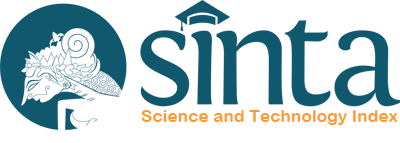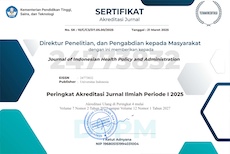Abstract
According to the 1945 Constitution of the Republic of Indonesia, health is one of the basic human rights. One of the aspects that support health is the aspect of pharmacy. Pharmacy workers consist of Pharmacists and Pharmacy Technical Workers according to Law No. 36/2014 regarding Health Workers. In practice, pharmacy education in Indonesia is considered not sufficient to prepare the pharmacy workforce. There are currently contradictions in the applied pharmaceutical policy, where the number of pharmacy undergraduate programs is 279, while the number of pharmacist study programs is only 45. This results in an imbalance of graduates. There is a tendency that most pharmaceutical graduates will continue their professional education to become a pharmacist so that he can have full authority and is responsible for pharmaceutical work. Differences in curriculum background and type of education will lead to confusion regarding competency assessment. At the Pharmacist education level, there is no nationally applicable curriculum until this date. The difference in curriculum causes variations in the knowledge and abilities of graduates. The method used in this study is a review of articles from various legal rules related to pharmaceutical education in Indonesia. The results of this study indicate a need for synchronization of the pharmaceutical policy into one legal aspect so that there is no disharmony among the applied legal regulations. Eventually synergistic legal regulations will emerge, from education to legal certainty for Pharmacist as health professionals.
Bahasa Abstract
Menurut Undang-Undang Dasar 1945 Republik Indonesia, kesehatan adalah salah satu hak asasi manusia. Salah satu aspek yang mendukung kesehatan adalah aspek farmasi. Tenaga farmasi terdiri dari Apoteker dan Tenaga Teknis Kefarmasian sesuai dengan Undang-Undang No. 36/2014 tentang Tenaga Kesehatan. Dalam praktiknya, pendidikan farmasi di Indonesia dianggap belum memadai untuk mempersiapkan tenaga kerja farmasi. Saat ini terdapat kontradiksi dalam kebijakan farmasi yang diterapkan, dimana jumlah program sarjana farmasi adalah 279, sedangkan jumlah program studi apoteker hanya 45. Hal ini mengakibatkan ketidakseimbangan lulusan. Ada kecenderungan bahwa sebagian besar lulusan farmasi akan melanjutkan pendidikan profesi mereka untuk menjadi apoteker agar dapat memiliki kewenangan penuh dan bertanggung jawab atas pekerjaan kefarmasian. Perbedaan latar belakang kurikulum dan jenis pendidikan akan menyebabkan kebingungan dalam penilaian kompetensi. Pada tingkat pendidikan apoteker, hingga saat ini belum ada kurikulum yang berlaku secara nasional. Perbedaan kurikulum menyebabkan variasi dalam pengetahuan dan kemampuan lulusan. Metode yang digunakan dalam penelitian ini adalah tinjauan artikel dari berbagai aturan hukum yang terkait dengan pendidikan farmasi di Indonesia. Hasil penelitian ini menunjukkan perlunya sinkronisasi kebijakan farmasi ke dalam satu aspek hukum agar tidak ada ketidakharmonisan antara peraturan hukum yang diterapkan. Pada akhirnya, peraturan hukum yang sinergis akan muncul, mulai dari pendidikan hingga kepastian hukum bagi Apoteker sebagai tenaga kesehatan.
Recommended Citation
Pratita, Rasta Naya and Bachtiar, Adang
(2021)
"A Study on Legal Policy of Pharmacy Education and Pharmacy Workers Related to the Urgency of Establishing Pharmacy Law,"
Journal of Indonesian Health Policy and Administration: Vol. 6:
No.
2, Article 5.
DOI: 10.7454/ihpa.v6i2.4445
Available at:
https://scholarhub.ui.ac.id/ihpa/vol6/iss2/5




